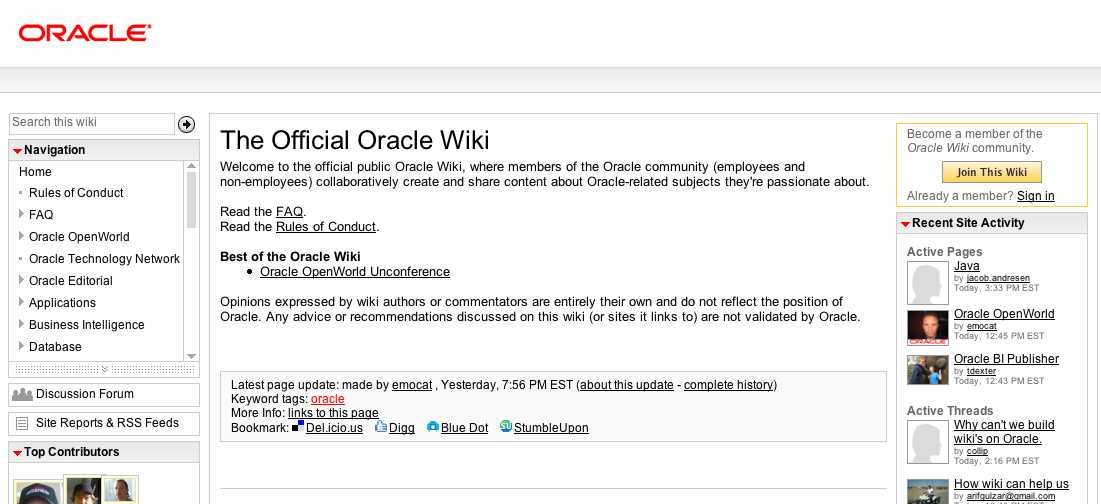Business
Subtle change at Oracle: old meets new
Anyone who reads this blog knows that I have a tendency to poke fun at Oracle and I'm not always kind. I've repeatedly asserted they 'don't get' but that's an opinion I may have to revise.


Anyone who reads this blog knows that I have a tendency to poke fun at Oracle and I'm not always kind. I've repeatedly asserted they 'don't get' but that's an opinion I may have to revise. That's the beauty of having strong opinions loosely held. ;) Here's what I mean:
In the run up to Oracle OpenWorld, the company has created an open Oracle wiki. Some cynics might have to read that again but it's true. Wiki developement was outsourced to Wetpaint that has produced a site with Oracle's corporate feel plus all the ease of use Wetpaint offers. Earlier today, I spoke with Oracle Technology Network leader Justin Kestelyn about this project:Internally we make extensive use of wikis. Twicki is the one that's most used but it requires knowledge of wiki markup. We want this to reach a broad audience including business users so having something like Wetpaint which doesn't require markup language knowledge is better for us and users.Justin is hoping that OpenWorld attendees will use the wiki as a way of reflecting their experiences back to Oracle:
One of the first things we got on there is the OpenWorld Unconference where people are encouraged to put up topics they'd like to see discussed. We've no idea how many we'll end up with and like most things, it's an experiment to see what works. We're hoping to learn from this.
There's a hardcore of several hundred database types. They're super-early adopters who have blogs and participate all the time. We have an expression: The Tom Kyte effect. It's similar to the Scoble effect where if Tom talks or links to your blog then you see a spike because Tom is seen as such an important authority on database. The same's true with Eddie Awad. We hadn't really announced the wiki, he found it and within a day we had 100 sign-ups.But there's more to what's happening at Oracle right now. On my personal blog I talked about a live collaborative project between SAPs Craig Cmehil, Oracle's Jake Kuramoto, Eddie Awad and myself. Craig is developing an add-on tool for Twitter that allows event attendees to group tweets for any event in which they're interested. The tool is called eventtrack. The idea is that users can then both follow and discover others who are attending the same event. That allows genuine conversational inclusion while providing interested persons with multiple insights. Coincidentally, Eddie had created a similar utility although Eddie's is restricted to OpenWorld. I understand Oracle plans to experiment with Craig's tool at OpenWorld. As I said on my blog:
This is a good example of what Professor Andrew McAfee calls emergent behavior where patterns and actions arise out of the unplanned use of these types of tool. What is unique is that we have representatives from two enterprise companies who would otherwise be highly competitive and yet who are working together on this wee project for mutual benefit.As Jake correctly notes, this is a working case study of the power of weak ties. This is a fascinating example of 'the social' working at enterprise level. At first blush it appears to be a validation of much theorizing we've seen the last couple of years. It is very early days and it would be wrong to get over excited. However, if this is an example of what we can expect to see in the future then I'm delighted that it should be two old rivals who are demonstrating that war does not have to be the normal modus operandi. It's a sign of maturity. Congratulations SAP and Oracle.